Playing with the possibilities, tensions and limitations of reimagining (higher) education from within
By Stephanie Marie Knox Steiner
A welcoming, an invocation:
Welcome, dear friend of the Ecoverse, fellow traveler on this path!
Welcome, body,
Welcome, breath.
Welcome, land that is holding us in our respective interconnected places.
Welcome computers or phones or paper that is holding these words between us, connecting us.
Welcome to the many other beings that are part of us. May they support us.
We are here, joined by these words, our breath, our existence on this precious planet, our shared dream of reimagining education towards being in service to life. May our aspirations guide us. I am so glad our paths have intersected here. Let’s begin, together.
Welcome to the crack I am sitting in: I am a doctoral student in the final stages of my dissertation about decolonial, pluriversal, vitality-centered pedagogies, on (re)orienting education towards serving life. As part of the process, I engaged in research conversations with people who are situated in higher education as well as several educational experiments beyond it: Pachaysana Institute (Ecuador), Springhouse Community School (US), and Unidiversidade das Kebradas (Brasil) about their pedagogical practices and the spaces and containers they create for decolonial, pluriversal, vitality-centered pedagogies. In this brief essay, I would like to explore the dissertation as a crack within the colonial capitalist university architecture, and the possibilities, tensions, contradictions, and limitations of the dissertation as a vehicle to play in the cracks of reimagining higher education from within.
What is a dissertation? I looked up the definition (you’d think I’d know by now, but as the thing consuming most of my time and energy for 2+ years, it has taken on a life of its own!), and definitions range from a long essay on a particular subject (Oxford via Google) to an extended usually written treatment of a subject. One that no one but my committee is ever going to read, I think to myself. And I’m reminded of the words of one of my research participants, that academia never produces anything useful, and the things produced through academic research rarely make it into classrooms let alone communities (which are too often viewed as separate from an academic lens). In thinking about the dissertation as a crack, I hope it might be useful to those of you within higher education, who might be similarly engaged in research, that we might think through ways we can play in these cracks together, and for those engaged beyond universities, I hope it might be an invitation to play with some of these ideas and practices in your respective cracks.
There are obvious tensions involved in writing a dissertation within the context of the modern colonial apparatus of academia on the “subject” of decolonial pedagogies. Decoloniality, pluriversality, relationality, LIFE, are not about individuals – they are communal, relational affairs. They are not subjects that can be siloed. One of the facets of coloniality is perpetuating the notion of separate, discrete individuals and subjects, of training us to see entities rather than relations. 1 So on one hand, a dissertation written by an individual can seem counter to this, and in many ways, it is.
One way I have been playing with this tension is thinking of the dissertation as a crack within the modern colonial structure of academia. Many decolonial thinker-practitioners – Catherine Walsh, Maria Lugones, Bayo Akomolafe among them – have spoken and written extensively about cracks as spaces of possibility and sites from within dominant culture/institutions where we can plant other ways of being/knowing/doing/thinking. In imagining the dissertation as a crack, in the cracks of the modern-colonial apparatus of academia, I am attempting to bring these conversations about decoloniality and decolonial pedagogies into this space, to amplify voices of some people who are practicing with them, and to widen the cracks ever so slightly as to what is possible within this dissertation container, and to plant seeds for an otherwise. As one of my research conversation partners, Chelsea Viteri of Pachaysana Institute, noted, these conversations have to reach different spaces, so this is a way of bringing this conversation – and hopefully more than just a conversation, a disruption, an invocation – into the space that I’m in and have access to, where I am presently standing and located.
Decoloniality and pluriversality involve holding multiple truths and perspectives at once, and being able to sit with the tensions, complexities, ambiguities, in contrast to the binary thinking that is characteristic of the Western (colonial) imagination. A tool that I enjoy using for playing in the cracks – the tensions of complexity, paradox, and ambiguity – are “vent diagrams,” which invite moving from the overlap, rather than seeing the overlap as a space of shared characteristics (as in Venn diagrams). The founders of the Vent Diagram project 2, Elana Eisen-Markowitz and Rachel Schragis, describe vent diagrams in the following way:
We define a “vent diagram” as a diagram of the overlap of two statements that appear to be true and appear to be contradictory. We purposefully don’t label the overlapping middle. Making vent diagrams as a practice helps us recognize and reckon with contradictions and keep imagining and acting from the intersections and overlaps. Venting is an emotional release, an outlet for our anger, frustration, despair -- and as a vent enables stale, suffocating air to flow out, it allows new fresh air to cycle in and through. We’re trying to make “vents” in both senses of the word: tiny windows for building unity and power, emotional releases of stale binary thinking in order to open up a trickle of fresh ideas and air.
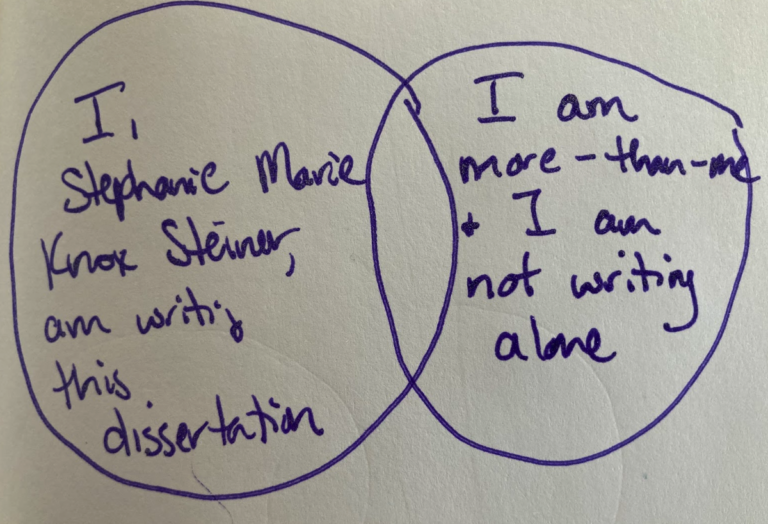
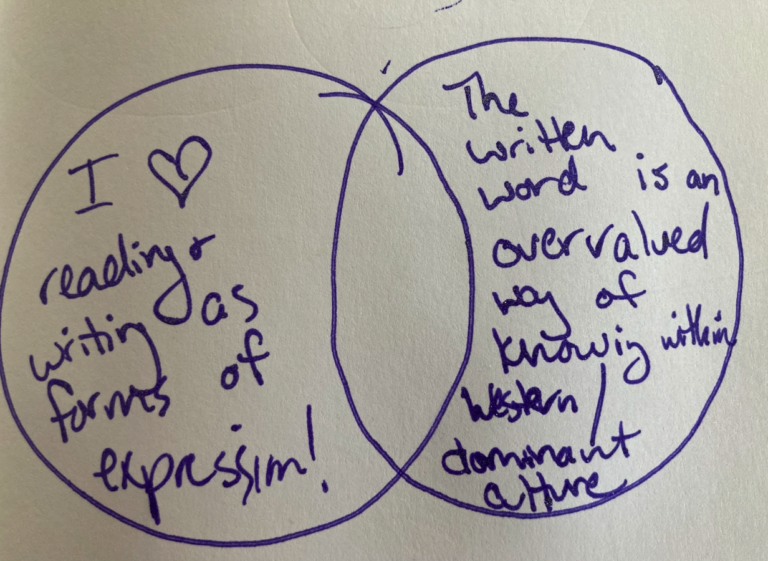
Inspired by Natasha Myers, Robin Wall Kimmerer, and adrienne maree brown, as well as by the witchy work of Sarah Faith Gottesdiener7 and Chani Nicholas,8 I have been thinking of the dissertation as a spell, and as an act of reciprocity with the world. In her essay on how to grow liveable worlds, Natasha Myers wrote, “We have to remember that we are living under a spell, and this spell is destroying our worlds. It’s time to cast another spell, to call other worlds into being, to conjure other worlds within this world.” So I have been thinking of the dissertation as a humble attempt to cast new spells. Our words are spells that we cast out into the world, and the words we use have the potential to cast new worlds into being, to amplify the other worlds that already exist, to amplify other worlds that are possible. This is not to give disproportionate weight to these words, but to acknowledge that they do carry weight, effects, and possibilities. Spells are acts of reciprocity with the world around us, acknowledging our entanglement with the land, the more-than-human and unseen entities, an acknowledgement that we intra-act9 with the world. In Emergent Strategy, adrienne maree brown offers spellcasting as a practice of generating personal and collective resilience, healing, and transformation.
Robin Wall Kimmerer describes writing as a way of being in reciprocal relationship with the world, honoring our responsibility to the world, and a way to express our unique gift as humans. Kimmerer explains:
In expressing our gift of words, we engage in reciprocity with the world, enacting our responsibility to the world, a way we can give back, as Kimmerer further expresses:
In the section of the dissertation where I discuss this, I offered the following spell:
May this spell and these words be worth the paper they are printed on, or the precious earth minerals and energy used to create the digital cloud being used to store them and the computer I am typing them on 12.
May they conjure worlds where less destruction and harm takes place to express these words.
May they be worthy expressions of decolonial, pluriversal possibilities.
I release colonial desires and habits of being13.
I let go of destructive ways of living.
I call in the awareness that I am more than me
And I act accordingly, with humility.
Another way to engage with the cracks of the dissertation is to assemble a committee that will play in the cracks with you. Two of my three committee members are part of Ecoversities Alliance (Bayo Akomolafe of the Emergence Network and Four Arrows of Fielding Graduate University), and the third (Helene Shulman) is a core faculty member in my program with whom I have worked closely over the past 6 years. The role of a committee in a dissertation is both crucial and limited: to provide feedback on drafts and, ultimately, approval or disapproval. From my understanding, the committee members are not well compensated through the capitalist education system. I would have loved to have worked more closely with the committee, but I hesitated to ask for more of their time (which is not to say they wouldn’t have provided it) because I do not personally want to further contribute to anyone’s exploitation and undercompensation. Here we have another vent/crack, that reaches far beyond the dissertation: on one hand, seeking to cultivate relationships rooted in respect, mutuality, and reciprocity rather than capitalism; on the other, acknowledging that we live within capitalism and not wanting to perpetuate exploitation by asking more of my committee than they are being compensated for. To use the words of participant Bianca Suyama of Unikebradas, I yearn for relationships that are “rooted in a different soil than colonialism.”
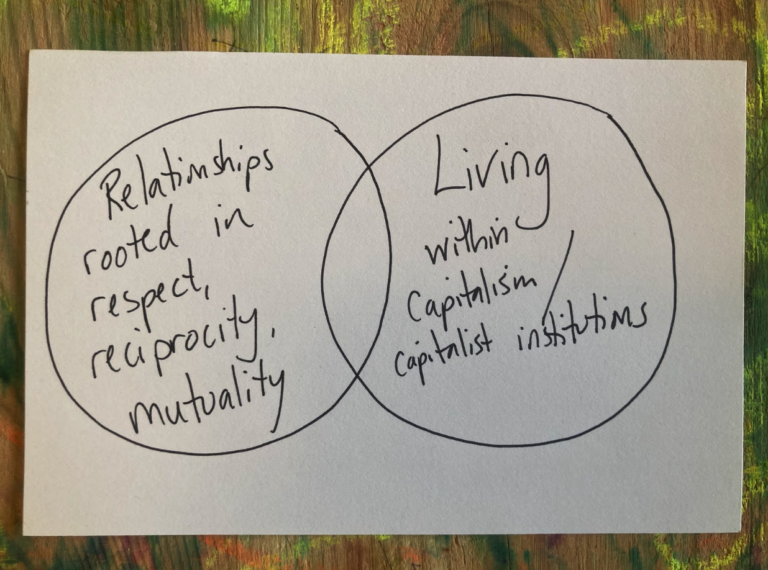
One of the most challenging cracks for me to play in and dance in was the aspect of time: wanting to allow the process to take its own time, balanced with the rhythms of my own life and the wider web of life while balancing the very real ticking of the academic clock in the background. In other words, the overarching challenge of writing a dissertation about education that serves life within an institutional setting that, at a minimum does not include it, and at worst actively excludes it. I started “the clock” in January 2020, not knowing what 2020 had in store for all of us. Once the clock starts, you are not allowed to pause it. It just keeps ticking – tick tock, tick tock, pandemic or not…and then at the beginning of 2021, my mother passed away unexpectedly, and the clock just kept on ticking, not pausing, which is what death and grief truly call for.
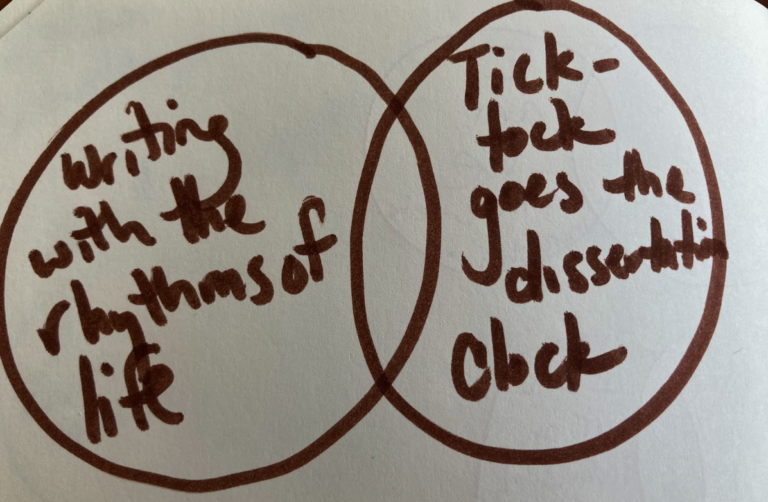
I tried to write in a way that honored the rhythms of my life – being a mother to a toddler, menstruation, lunation, seasons. I know that rest is generative – and valuable and necessary in and of itself, not just for its regenerative, creative potential – but this is not valued in capitalist society, or by an educational system grounded/founded in capitalism. The dissertation clock does not stop for life, death or pandemics. My understanding of this clock is that it has to do with institutional accreditation in the US (which has regional governing bodies), so is an imposed requirement from the accrediting agency beyond the institution itself. This is an example of how Western colonial capitalist education has become separate from life, and does not honor life and rather fights against it or ignores it. And here, I encounter one of the deepest cracks: writing about education in service to life within an institution that feels very separate from it, even abrasive to it.
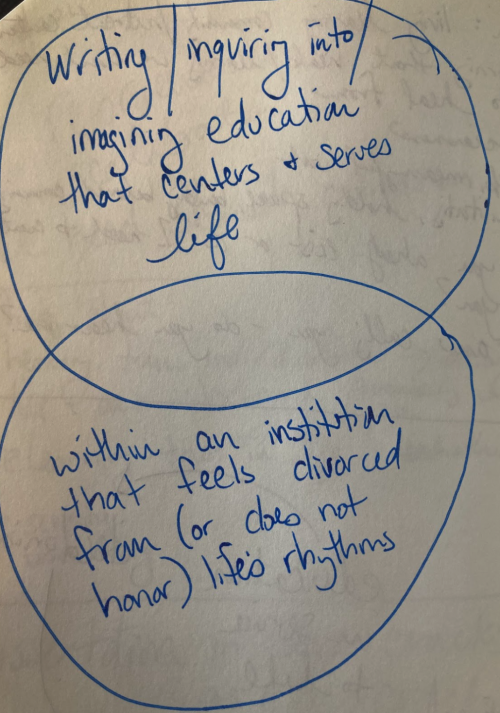
It is painful for education to be separate from life and this is a part of the process where I felt it acutely: to hear the ticking clock while grieving the loss of my mother, while lacking childcare support due to the COVID-19 pandemic. This pain was also discussed by some of my research participants, especially those working in mainstream higher education: the acute level of pain that their students were coming to class with during the pandemic, and not being able to do much beyond maybe accepting a late assignment. Which is clearly not enough. We desperately need educational spaces that honor, include, and work with the cycles and rhythms of life rather than fight against them or pretend they don’t exist.
Besides just being painful, it is a missed opportunity when we feel like we have to leave parts of ourselves at the door, as there is so much learning that can come from engaging with the in-between spaces in our lives and identities – the cracks, the vents. One of my research participants, Daniel Bryan of Pachaysana Institute in Ecuador, spoke of how Pachaysana works with the in-between space: “There are so many in-betweens: there’s the in-between the academic institution in the community, that’s an easy one. But then there’s all the in-betweens within yourself – you’re a student, and you’re a mother, and if you embrace the in-between, you can learn so much about both of those elements of your identity.” What a loss, when we are forced to leave parts of ourselves outside of our learning spaces.
Ultimately this process is just as important as whatever outcome it produces – they are not separate. And if I want to see different results, I need to proceed differently. Slowly – not just as a matter of velocity, as my teacher/mentor/brother/committee member Dr. Bayo Akomolafe says, but as a way of doing things differently, of listening differently, attending differently, of hearing the voices at the margins, human and more-than-human alike. There is a bureaucratic slowness in academia that is viscerally and qualitatively different from the slowness Dr. Akomolafe is speaking to.
In many places but most recently in his We Will Dance With Mountains: Into the Cracks! course-festival, Bayo Akomolafe has spoken of cracks as invitations to fail. I found myself asking: if the dissertation is a crack, what would it mean to fail? Or at least be willing to fail?
The clock does not allow failure. There is no inbetweenness here. Either you pass or you fail. You make it or you don’t. You graduate or you don’t. There is no inbetween. As I awaited final approval, there was definitely a voice inside me that anxiously worried, “What if they hate it? What if I fail?”
For those of us who’ve gone through extensive years of formal schooling, fear of failure can be an area in need of healing. Performing intelligence and performing correctly are so deeply ingrained in us through formal compulsory schooling, and we can be very, very afraid of being wrong, of failing. Of course, if I were to fail this dissertation, it would have been a colossal waste of time – or would it? And by whose standards? Certainly, I think the biggest failure would be if I didn’t do justice to the stories and experiences shared with me by my research conversation partners. Failing my collaborators, failing to be accountable to them, failing to share their stories accurately and meaningfully – that would be failure.
Is the point of the dissertation the diploma? If yes, then that alone feels like a failure.
Returning to the definition of dissertation, I began thinking of the definition of the prefix dis, which means “a negative or reversing force.” How might this dissertation, in its own way, be a reversing force – of modernity/coloniality, of rampant individualism, of the overvaluing of Western knowledge and the written word, of the separation of humans and nature…of all my formal schooling?
Perhaps the “findings poem” from the dissertation itself, which weaves together threads from the research conversations, speaks to this reversing force, of delinking14/unlearning from destructive worldmaking practices, and relinking/relearning life-affirming worldmaking practices:
Decolonial Pedagogies Poem (Findings, Summarized)
Decolonial pedagogies are
Pluriversal
Vitality-centered
Relational
Convivial
Contextual
Abolitionist
In service to and oriented around life, buen vivir.
There is no one path, recipe or way
There are many paths and ways
We might meet each other on the road – at a crossroads, perhaps
On this lifelong journey
An alive quest
Of learning/unlearning.
We might (re)orient ourselves together with compass points, moving towards
Seeing relationships: ourselves, our bodies, the land, each other
Generative conflict
Relationships that are intergenerational, horizontal, long-term,
Relationships grounded in trust, consent, reciprocity, accountability, commitment, vulnerability, love, rigorous care.
We may orient towards
The Pluriverse
An education for life, in service to life, connected to life, not separate from life
Lifelong becoming
Grounded in epistemic justice and
Collective love-based leadership
As we play in the cracks
Holding the tension, complexity and complicity together
With a heavy dose of reflection and humor.
May we be lighthouses
Rigorous in care
Creating generative fields
Of growth, love, care, trust, and transformation
Vast enough to hold all the complexity and tension.
It is so important that we do the work together
At the core
Because we can’t teach what we don’t know
And yet,
We are all trying to figure this out together,
And we can hold both of those things
The importance of doing our inner/collective work
And knowing it may not be enough
That we will still not know and we can only figure things out together.
May we choose to see relationships
And seed relationships that are rooted in a different kind of soil other than colonialism
But it is the soil we were planted in
So how do we compost to create a soil that is more generative, less toxic, less harmful, more life-sustaining, nurturing, caring?
How do we become seeds in the cracks of the walls of colonial architecture?
How do we
Decenter without disappearing
Decenter without re-hierarchizing
Decenter without romanticizing
Decenter and reintegrate to make whole
Reach beyond without bypassing?
May we ask questions that may not have answers, and be willing to be bewildered.
May we (re)orient ourselves and be willing to get lost, not knowing where we are heading.
May we be seeds in the cracks of the colonial capitalist white supremacist patriarchy
Growing other worlds where many fit
Vines reaching towards otherwises
Out of and beyond ivory tower cracks.
May we learn, unlearn and learn beyond 15 towards a world where it’s easier to love.
May we learn and unlearn to decolonize.
May we learn to be in service to life.
May our actions be more honorable.
In summary, here are some of the ways I played with how to write an Ecoversities-inspired dissertation within a mainstream academic institution. I have not discussed all of these in detail in this essay, but hopefully they can provoke some additional ideas/insights:
- Think of the dissertation as a crack, as a dissertation, a reversing force.
- It is not an individual exercise – remember, you are not a discrete, separate entity, you are never writing/thinking/being alone, and all acting is an acting-with16. There are co-authors – try to name them as you are able.
- We are always collaborating – collaborate, co-create, and attend to the collaborations and co-creations that always already exist, human and more-than-human alike.
- Assemble a committee of Ecoverse weavers to help guide and take part in the process.
- Give yourself fully to the question. Let the question morph as you live into it.
- Write as an act of reciprocity, as a way of casting new spells into being. Even amidst writing, keep in mind overvaluing the written word. Write by hand, even occasionally (at least keep a handwritten notebook).
- Reorient your relationship to text17. Notice how consumptive and extractive patterns might show up in the way you read. Read with dwelling mind18.
- Dance with the clock (if you have one); dance/write to the seasons and rhythms in your life.
- Don’t just write – do something.
- Be willing to fail. Cracks are invitations to failure19. If the dissertation is a crack, how might we invite failure?
There is so much that could be added to this list, but these are some of the ways I have attempted to play with the dissertation as a crack, in the cracks of academia. If you have engaged in a dissertation, I would love to hear how you have engaged and danced. I sense that the Ecoversities version of a dissertation could look many different ways, just as each experiment in the Ecoverse is unique. And if you would be so inclined, I would love to hear how you are engaging with research, inquiry, capstone projects and the like in your ecoversity spaces.
To close, I offer you a poem from the (in)conclusion chapter of the dissertation. When I sat down to write the conclusion, I pulled a card from an archetype deck (The Wild Unknown by Kim Krans), asking the question, “What inspiration do I need to hear as I sit down to write this conclusion?” I pulled the Pilgrim card, and this poem emerged.
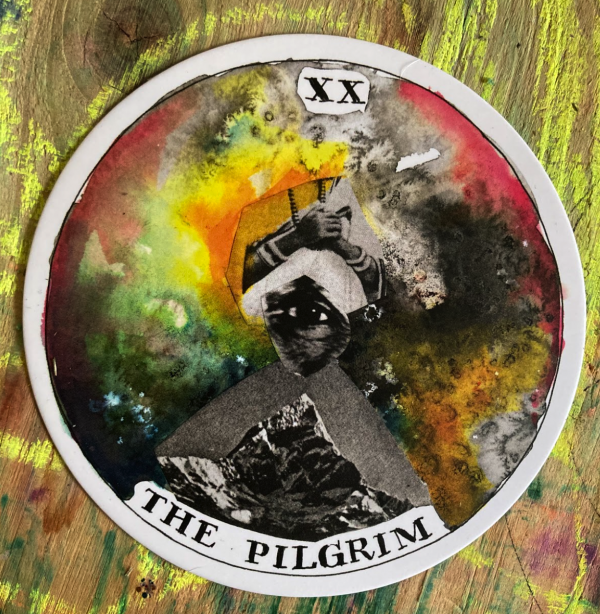
This dissertation – this learning journey – has been a pilgrimage.
I bow to the altar of learning and unlearning.
I arrive to the last pages exhausted, crawling, thirsty, bloody, reaching.
Just.
Stop.
Dear Pilgrim, there is no destination.
You arrive with each step.
You will keep walking, stumbling, falling, failing, leaping, dancing.
Don’t forget to twirl.
Let your child teach you, remind you how.
The steps can be fun and playful and joyful and filled with beauty.
When you meet puddles, splash in them.
Don’t jump over hurdles – dance through them.
Your steps need not be a slog.
Take off your shoes and dance on the Earth.
Let yourself get dirty, and return.
Footnotes:
1 Walter Mignolo, On Decoloniality, p. 148.
2 https://www.ventdiagrams.com/vision-and-values
3 At the Re-imagining Education Conference 2.0 in February 2022, the Foresta Collective shared a beautiful practice of “not only” inspired by Marisol de la Cadena.
4 A term coined by Zen Master Thich Nhat Hanh to describe the insight that we are beyond interconnected; everything exists because of everything else, and there is no separation.
5 Blanche Verlie, Karen Barad, Donna Haraway.
6 I am a very novice student of astrology and primarily am a fan-follower of Chani Nicholas, a US-based astrologer who uses the whole sign houses system of interpretation. This is also to acknowledge that there are many astrologies and ways of relating to the stars, planets, and celestial bodies.
7 Author of The Moon Book, curator of The Many Moons Lunar Planner, and host of the Moonbeaming podcast..
8 Author of You Were Born for This and creator of the CHANI astrology and mindfulness app.
9 Karen Barad’s concept of intra-action makes space for our entanglement as not separate entities, and that agency emerges through relationships.
10 Robin Wall Kimmerer, Braiding Sweetgrass, p. 347.
11 Robin Wall Kimmerer, Braiding Sweetgrass, p. 152.
12 Could they ever be?
13 Thank you to the Gesturing Towards Decolonial Futures Network for this language.
14 The language of delinking/relinking comes from Walter Mignolo.
15 Thank you to Dina Bataineh of the Ecoversities editorial team for this language.
16 Karen Barad
17 From research participant Darius (pseudonym), who works in a university setting.
18 Margaret Wheatley, Who Do We Choose To Be?
19 Bayo Akomolafe
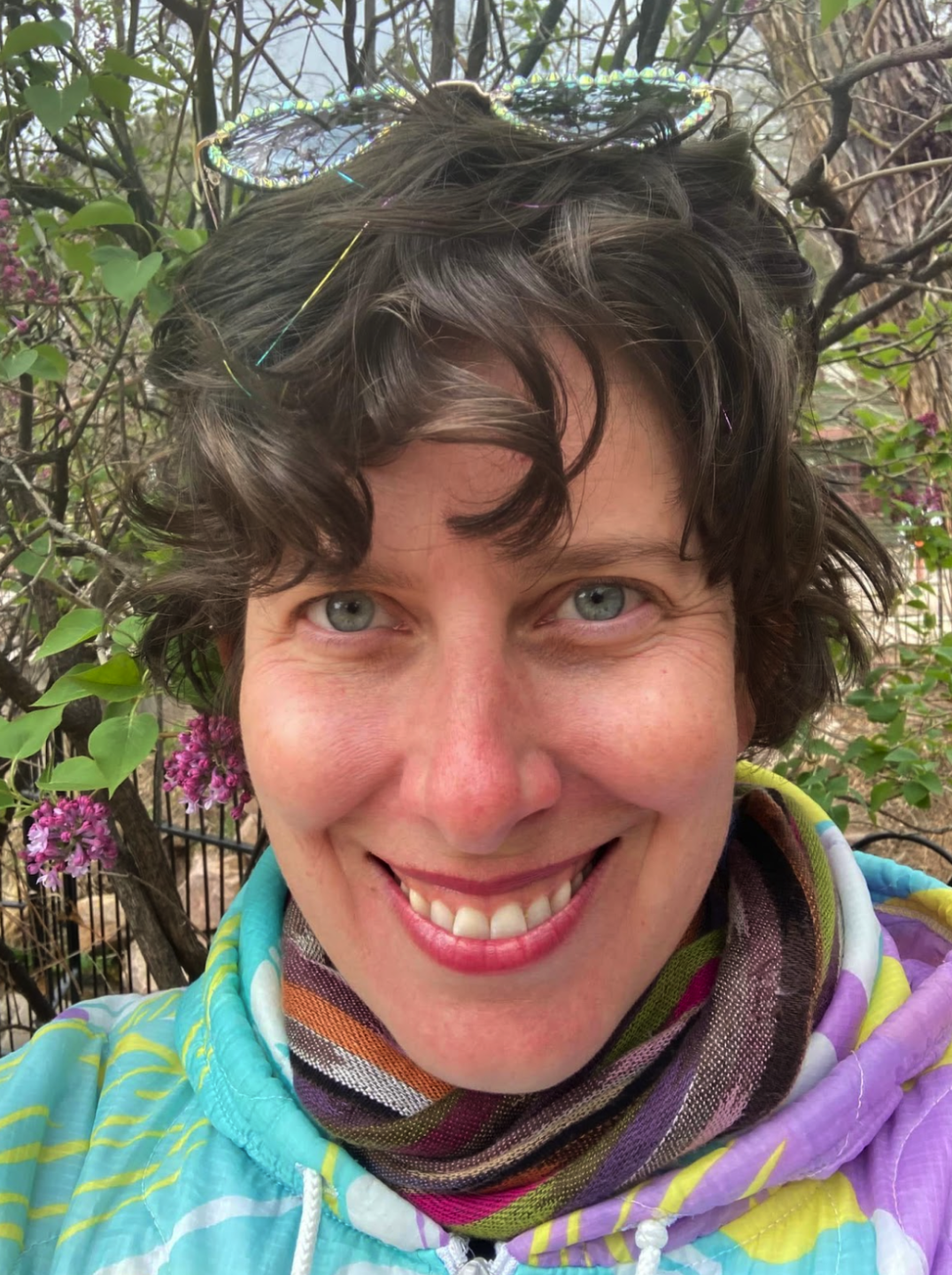
Stephanie Marie Knox Steiner (she/her) is a mother, scholar, and doctoral candidate in the Community, Liberation, Indigenous, and Eco-psychologies specialization at Pacifica Graduate Institute. She is currently living on unceded Nuuchiu (Ute) territory otherwise known as Colorado Springs, US. Her dreamings and doings around reimagining education currently lie in the vent diagram of peace education, decolonial pedagogies, and unschooling/deschooling/self-directed education. She is also a student of Zen Master Thich Nhat Hanh, an ordained member of the Order of Interbeing, and a member of the Earth Holder Community caretaking council, an earth and racial justice initiative in the Plum Village Community of Engaged Buddhism.


